The World Still Belongs to Kylie Minogue

It’s a sunny afternoon in Los Angeles, but inside a nondescript bar in Hollywood’s Pendry West Hotel, a lavish champagne-topped celebration, fit for the late hours of the night, is well underway. For just one day, the space has become a stand-in for the belle de nuit-inspired Voltaire nightclub, an intimate venue located in Las Vegas’ famed Venetian resort — and it’s all for the Australian pop queen Kylie Minogue.
Inside, Minogue is gliding through a room of influencers and journalists and flashing her signature smile. She’s about to announce that she’ll be Voltaire’s inaugural star as she kicks off her first-ever residency this November, though the news feels like Vegas’ worst-kept secret: rumors of the pop veteran hitting the Strip have been floating around all summer. Still, Minogue is so excited, she’s practically bubbling over like a glass of her namesake prosecco. Vegas had been on her mind for a while, but she wanted to make it happen at just the right moment. Now, with an almost four-decade career and new chart-topping hit, there’s no better time.
More from Rolling Stone
“I was thinking years ago, I want to do it when I’m younger, not when I’m at the sunset of my career,” she explains during a roundtable before the party. Surrounded by ice buckets filled with Kylie-brand wines, the petite pop princess holds court with every single person trying to grab a few minutes of her attention; like true pop royalty, she’s chatty and attentive, even recognizing a few familiar faces she’s encountered before. (“I missed the caviar!” she trills at one point, having been too focused on schmoozing to grab a bite to eat.)
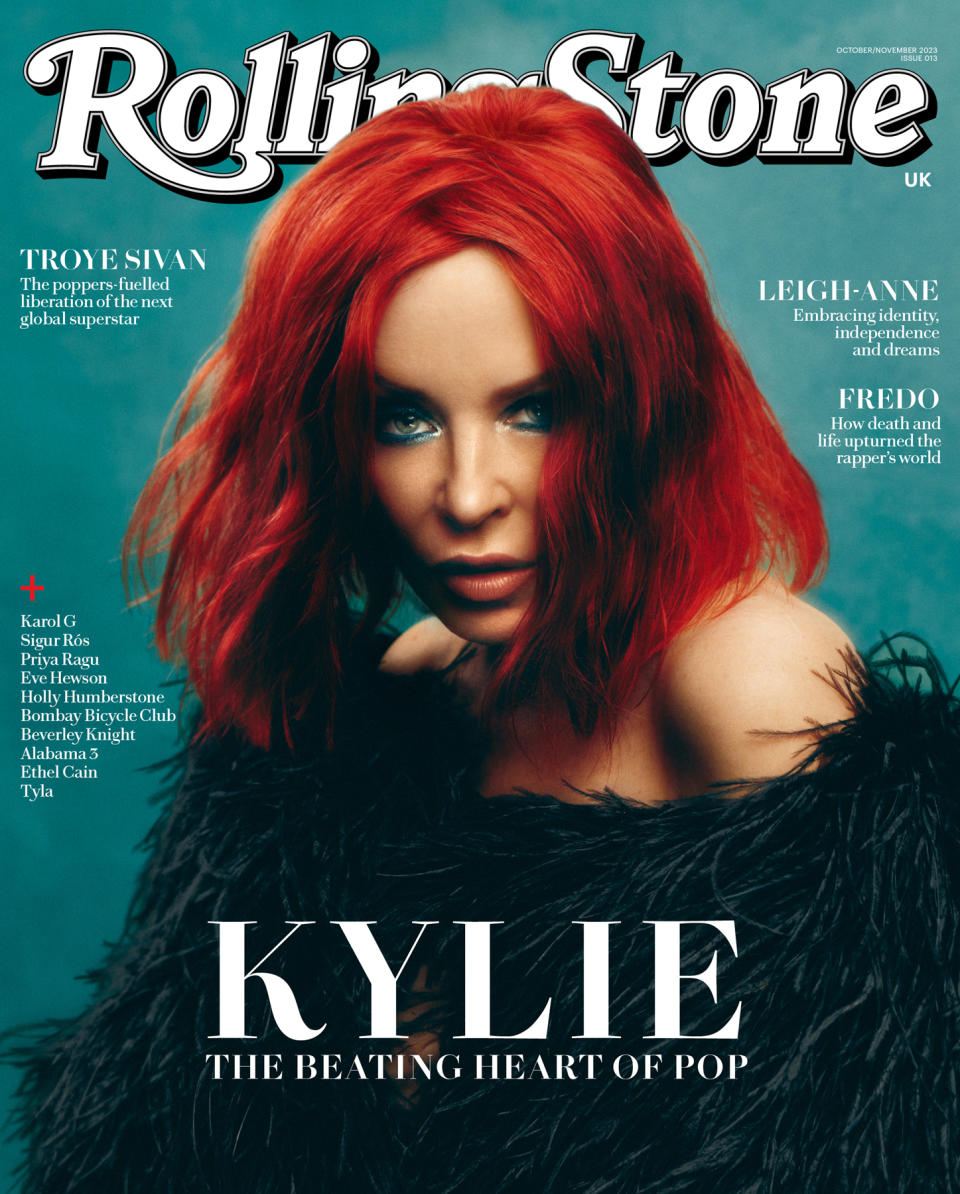
Minogue’s Vegas residency has been nearly three years in the making, with talks beginning around the time she released 2020’s Disco, an album that channeled the spirit of the dance-floor divas of the 70s. The LP arrived smack-dab in the middle of the pandemic, when no one could sweat out her songs at the club like she’d envisioned. However, Minogue found herself on the same wavelength as stars like Dua Lipa and Jessie Ware. The trio of disco revivalists formed a united front as they celebrated the genre, sometimes including each other in their livestreamed shows and even in a few collaborations. Minogue’s own livestream, the 50-minute Infinite Disco sold close to 30,000 tickets during its initial broadcast.
But no one could have predicted what would happen this summer when Minogue dropped “Padam Padam,” the first single from her forthcoming 16th studio album Tension. An onomatopoeic title, meant to capture the sound of a heartbeat, the song became the summer’s first pop zeitgeist moment and a global blockbuster soaring up the charts across the world. It also arrived just in time for Pride month in June, serving as the unofficial anthem for parades and celebrations everywhere. Even Prince William and US Vice President Kamala Harris caught the “Padam” spirit that month, signaling the exact kind of crossover song that most artists wait their entire lives to enjoy.
“Whenever a song is released, in an instant, it’s no longer yours. It takes on its own life,” Minogue says. “This one grew up real fast. And it’s not slowing down.”
For her, this is yet another milestone, taking the already established pop legend to brand-new heights. And “Padam Padam” is just the beginning of another major Minogue rebirth. One of pop’s hardest and most consistent workers, Minogue got back in the studio in 2021 to start Tension — another euphoric dance project from the queen of consistently delivering euphoric dance projects.
But like so many great pop icons have often had to endure, it has at times felt like the world is just catching on to Minogue’s impact. She has created some of the most timeless pop singles of all time and left an indelible influence on the likes of Lady Gaga, Romy, and countless other dance-floor doyennes. Now 55, with all signs pointing to her profile continuing to grow bigger still, Minogue is welcoming the love. “I feel like a lot of good things are coming together at the same time,” Minogue tells me later that day, having changed into a sparkly silver top and shiny, black thigh-high boots. She knows that these moments are the type you can never anticipate. She’s soaking up every second.
TO KEEP UP in an impossible business, Minogue has become one of its most adaptable stars. That malleability is apparent on the set of Rolling Stone UK’s cover shoot: she’s instantly game when someone suggests putting her in red wigs, leaning into the reputation she earned in the 90s and 00s as pop’s ‘great chameleon’, when she would switch up her image with each album release. “Sure, let’s give it a try,” she says. On set, Kylie throws herself into every set-up, knows her angles, and works through every pose. There’s a disarmingly curious casualness in Kylie’s approach to bringing her music to life that makes pop superstardom seem so… effortless.
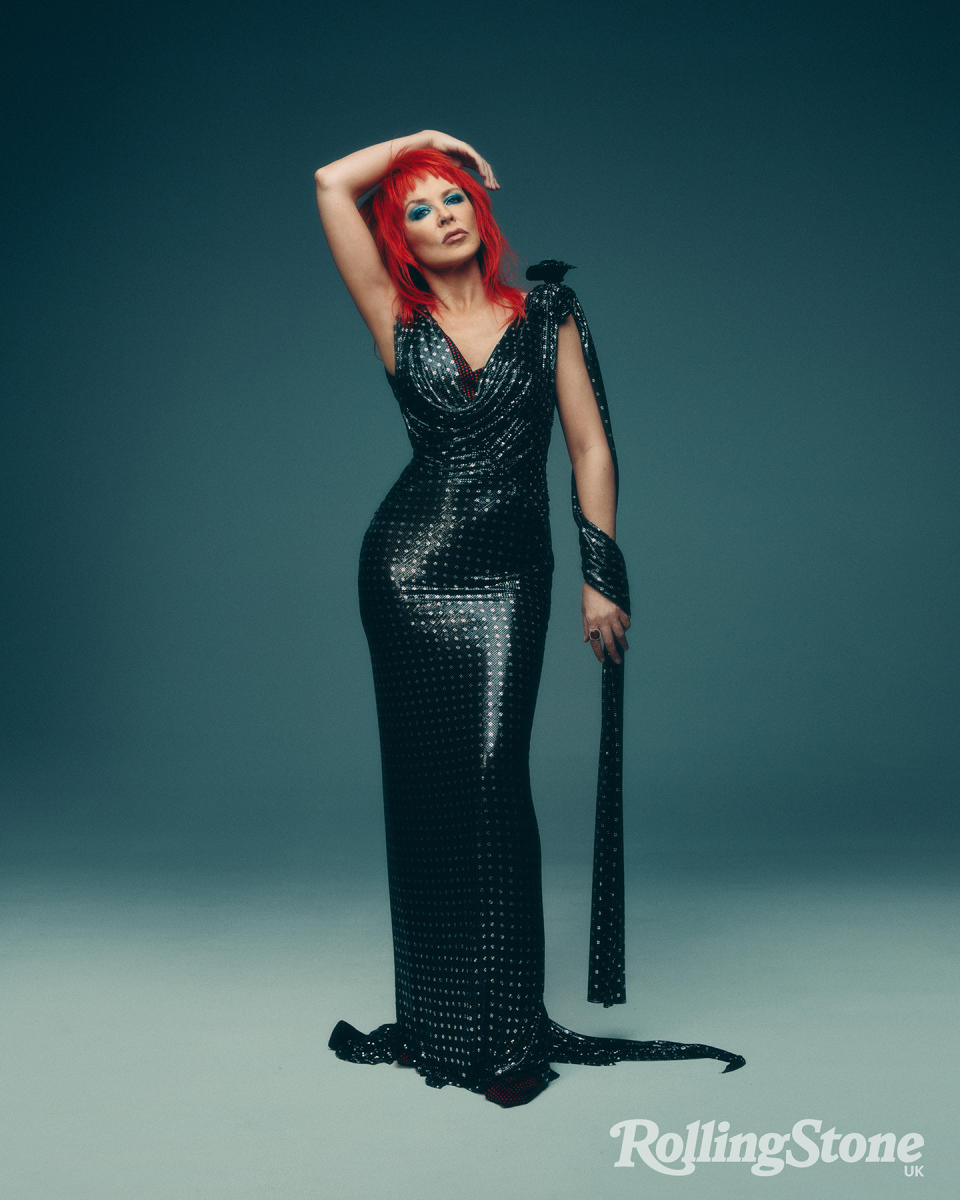
And yet, Minogue’s career has been marked by challenges since the beginning. As a teen, she had her big break on Neighbours, a soap so popular in the 80s that at one point it was watched by a global viewership larger than the size of Australia’s population at the time. But when she decided to pursue her musical dreams with her first few singles, her pop identity was deemed too safe and virginal until she dated INXS’ Michael Hutchence. Later, her alternative experimentations were met with mixed reviews from fans and critics alike. “And now as a woman of middle age, there’s been challenges in every part of my career,” she says. “Pop is supposed to look easy. But as we know, it’s a lot of work to [make it] look easy.”
That work continued in 2021, when Minogue “crept back into the studio” with some long-time friends and collaborators, like songwriters Richard “Biff” Stannard, Duck Blackwell and Jon Green as well as her trusted A&R Jamie Nelson, whom she’s worked with on and off since signing to Parlophone in 1999.
“Initially we were thinking 80s, but it didn’t pan out that way,” she recalls. “We agreed there’s no theme [and that] it’d be refreshing not to have a theme after having done [country-inspired] Golden and Disco.” The rule of thumb during their sessions was to “service the song”.
“If the song could stand up on its own and if it bumped up nicely with the other songs, that’s the album,” she says.
Having to finish Disco during lockdown revolutionized how Minogue creates music now. She rarely steps into proper studios anymore to record. Instead, she travels around with a Telefunken microphone set-up so that she can record herself whenever the mood strikes, or a demo comes in.
“I did so many years and years and years, especially in the early days, of just being really nervous,” she says of recording in expensive studios at the start of her career. Those nerves would “inevitably” lead to bouts of tonsillitis or other wrenches being thrown into her plans to record at the reserved spaces.
“Home recording and just being able to play any time is preferable to me,” she says. ‘Padam Padam’ was recorded in a London hotel room, shortly after Nelson sent over the demo. The lead single is one of only a few songs on the album that Minogue herself didn’t co-write, but the recording process is where her perfectionism really begins to take over.
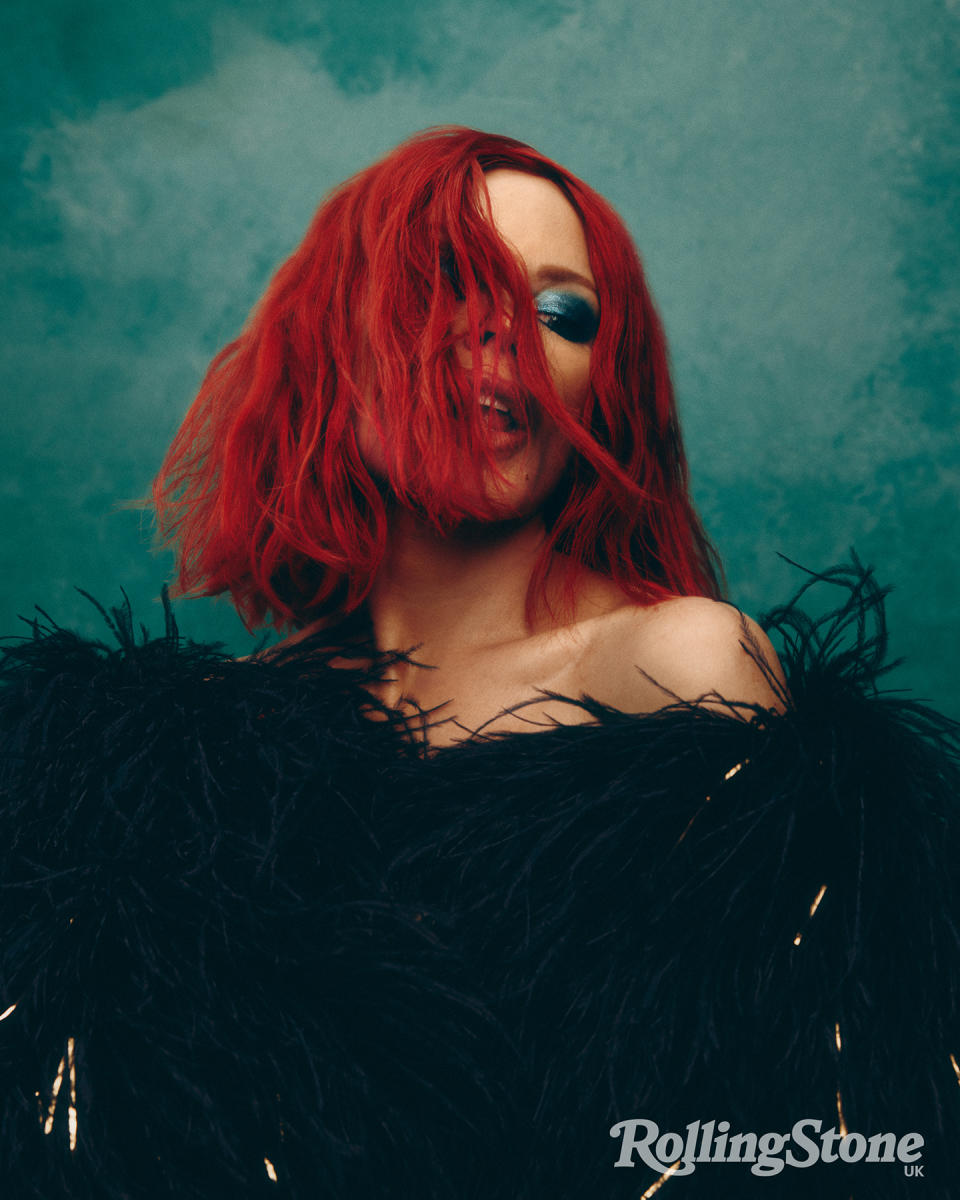
“I will drive myself crazy mimicking [the demos],” she explains. “What’s so helpful with self-recording is I can spend hours doing that to the point where I go ‘Shut it down now.’”
Not long before starting to work on Tension, Minogue moved back to Melbourne after three decades living in London, where most of her collaborators have long been. She worked on much of the album from Australia or London hotel rooms when she was in town, but it became clear that she needed a week with her “dream team” of Biff, Blackwell and Green all living and writing in one place. Since Biff doesn’t fly, they chose to stay local, finding a “sweltering” Airbnb in Surrey where they holed up together for five days last August as the temperature outside reached 39 degrees Celsius. The house was a godsend: they left with at least 10 new songs.
“You know after you’ve had a really amazing experience together and it lingers and you need to still reach out to each other because you just had such a great time?” says Minogue, grinning from ear to ear. “We were having breakfast, lunch and dinner together and making music. It was just glorious.”
For a few sessions, the quartet were joined by rising songwriters Anya Jones and Camille Purcell (aka Kamille). It was the “female energy” Minogue needed to get out of her comfort zone. She credits Purcell’s “chutzpah” in particular for giving her confidence to sing the braggadocio lyrics on ‘Tension’ where she purrs “Call me Kylie-ay-ay.”
“She was a household name for me and my family,” Purcell says of growing up a Minogue fan. “I think it was just part of my DNA, knowing her name and her music.”
Purcell felt pressure to impress one of her heroes, but it didn’t take long for her and Minogue to connect. Purcell’s two credits on the album were written the same day.
“She’s so down-to-earth. You don’t even think you’re in the room with Kylie. You feel like you’re in the room with a friend you’ve known for a long time. It was such a crazy experience to feel that you know someone so quickly,” Purcell says.
Minogue credits working in TV from a young age for instilling a sense of teamwork in her. “I didn’t start as anything close to a diva,” she says. “I don’t know that you get anything extra without being human first.”
Purcell continues, “I think she has the power of disarming people straightaway.”
“It’s not an act,” Minogue affirms, “otherwise I would be a very, very good actress to have kept it up for that long.”
DISARMING AS SHE may be, Minogue is one of pop’s most guarded stars. She is not one to typically sit for hours and do tell-all interviews. When paparazzi catch her, it’s outside of events or for the rare vacation snapshot. In conversation, she chooses her words carefully, tying every potentially intimate revelation back to her work in a neat and well-practised way.
There are few who know her as intimately as her frequent collaborator Biff. Their friendship stretches back to 1999, but he has considered himself a Minogue fanboy for much longer than that. He was, as he recalls, “a young gay man” doing the dance routines to ‘Better the Devil You Know’ and ‘Shocked’ in clubs in the early 90s; she was a well-established icon for her gay fans long before the entire world would catch up.
Biff took particular notice of the shifts in Minogue’s career as the mid-90s hit, and she parted ways with her label PWL and the song-writing trio of Stock Aitken Waterman, who were behind her first four albums. Her sound not only became darker, but also riskier with her in the driver’s seat. She even found herself in the studio with the brooding singer-songwriter Nick Cave, an avowed fan of Minogue. The trip-hop single ‘Confide in Me’ and Cave duet ‘Where the Wild Roses Grow’ had Biff, and many others, taking a serious look at Minogue’s own artistry.
Meanwhile, Biff was gaining pop traction as the musical brain behind some of the Spice Girls’ biggest hits. As Minogue moved to Parlophone, Nelson connected her with “Biffco”, the songwriting team Biff led. When ‘Can’t Get You Out of My Head’ (written and produced by Cathy Dennis with Rob Davis) became her first proper commercial breakthrough in the US market, ushering in a Minogue renaissance around the world, Biff and Kylie would go on to have a massive hit on their hands with ‘Love at First Sight’, the third release from the 2001 Fever album.
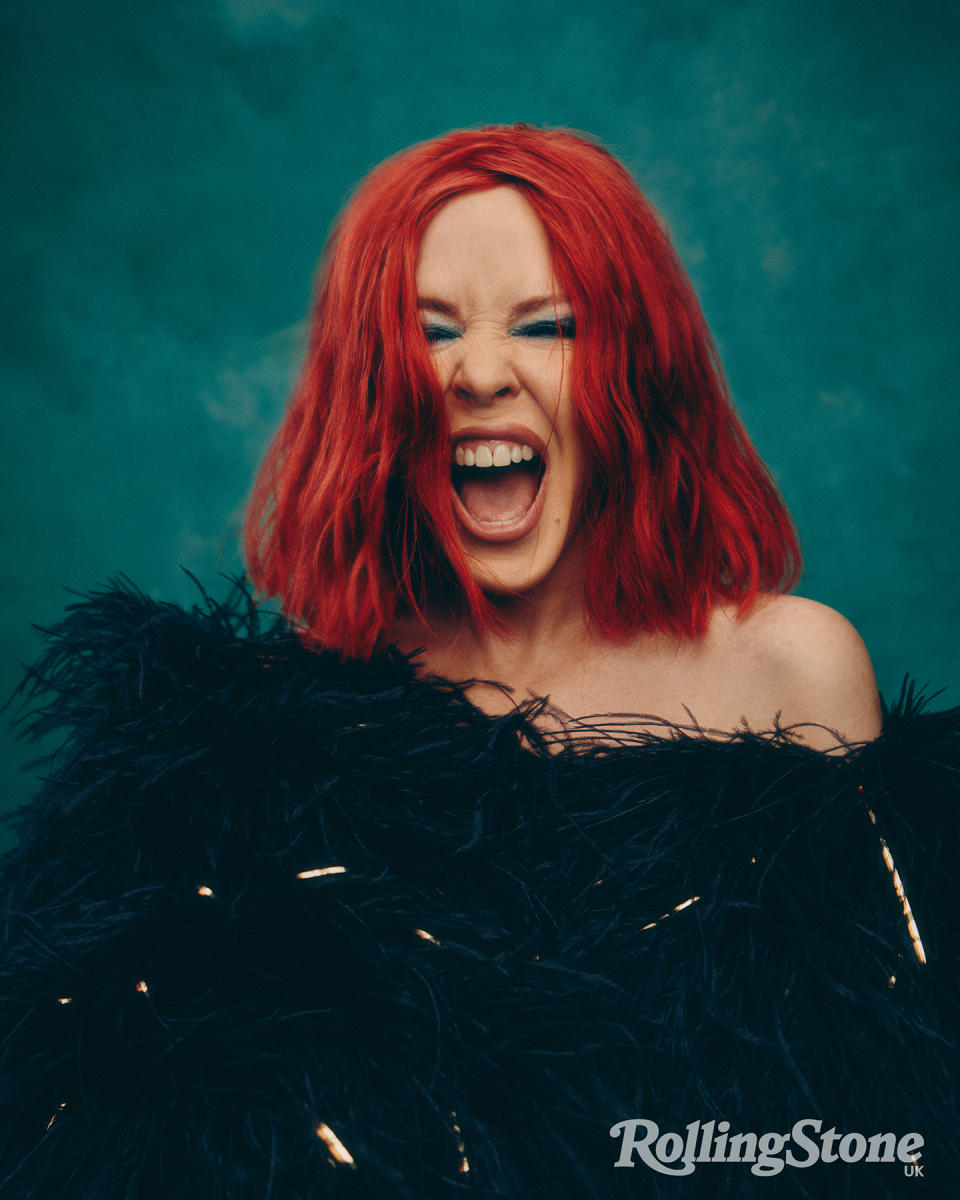
“We’ve got a lifetime of friendship and stories and I don’t know how many songs we’ve done together, if we add up the songs that didn’t make it and that did,” says Minogue, adding how he brings out a creative freedom that she’s needed over the past 24 years. “I find when I write with Biff, I write really instinctively, initially. I feel like I can be expressive and less formulaic in a way. Then we have to make it formulaic.”
“Songs come from our conversations as friends, from my life, everyone in the room,” Biff explains. “There is a family around her of friendship, love and trust. And it’s tight, like a lot of great artists. I’m never gonna mention scenarios or songs, but there’s definitely one song on this album that is about something I’ve been through that she privately knew about that many others wouldn’t.”
In the comfort of those sessions, with someone who has known her personally and professionally for so long, Minogue is open and honest, but how much she’ll let her listeners in past the bubbly pop pixie persona is a negotiation.
“I’m happiest when I feel like I’ve expressed some deep emotion or thoughts that I’m struggling with and it’s like talking with a friend,” says Minogue. “Speaking your truth is helpful. When I am able to do that, I like to almost paint it instead of just spilling it out. I like to have some poetry with it to not be entirely obvious.”
Minogue became fiercely protective of her personal life at a young age out of necessity; tabloids and paparazzi quickly leeched onto her while she starred in Neighbours and even more so as she became an instant pop star with a few big hits under her belt from the start.
“What I think is great for a lot of people now is that there’s a discussion about mental health and the toll [fame] can take on people. I had that. I lived that,” she says when we speak on a call from her new-ish home in Melbourne. “I was able to manage that myself and with my family and close friends and navigate those waters. It wasn’t a decision [to stay private]. It was a reaction to protect myself and to protect my family because they would go through it with you.”
What’s her secret to keeping much of her life away from the public eye? “It takes common sense. It takes some work, and it takes some sacrifice,” she says. “I can really go from doing a full kind of blitz of doing it all and then stop and recalibrate.”
While Minogue goes to great efforts to keep her world as private as possible, the snippets that she does reveal point to a life that is ridiculously normal. The larger-than-life diva who transformed into a Grecian goddess surrounded by fountains on her Aphrodite tour is more concerned lately about when she should finish watching the last five episodes of Succession (“I almost don’t want to do it because everyone said the ending is so good. I feel like I’ve got this delayed gratification”). She considers herself a very good binge-watcher and loves a “little vacay”. As she’s got older, she’s come to appreciate trips where she can just relax and do nothing. “I used to be the adventuring type. It’s funny, different stages of life. I’d really kind of scoff and say, ‘Why would you want to sit on a beach for a week?’ And now I’m thinking, ‘A week on a beach would be great.’”
Biff says he and Minogue share a lot of music with one another, like Sigur Rós and some “quite heavy” dark electronica. The pair would also have regular “Ryan Murphy evenings” where they would watch Feud dressed up as either Bette Davis or Joan Crawford.
“I even have a mini Oscar saved in my house still,” he says with a laugh.
Minogue herself doesn’t account for many other hobbies. She’s a bit of a workaholic, having taken few breaks in her career. The longest one she embarked on was when she was getting treatment for breast cancer two decades ago, but even then, she wasn’t gone for very long. Her time between most albums is punctuated by long tours, the rare appearance on-screen or work behind-the-scenes on her wine and fragrance companies.
“Sometimes [a long break] crosses my mind,” she admits, “but it’s fairly fleeting.” She’s as restlessly curious as she is a perfectionist, wanting to open up a new world and see how she can make it work for her.
“There’s a song that hasn’t been written yet,” she continues. “‘Padam Padam’ didn’t exist a year ago. I guess the ultimate seduction or challenge is to create that three and a half minutes of transformative magic. You want to try and keep getting that high [of] affecting someone positively.”
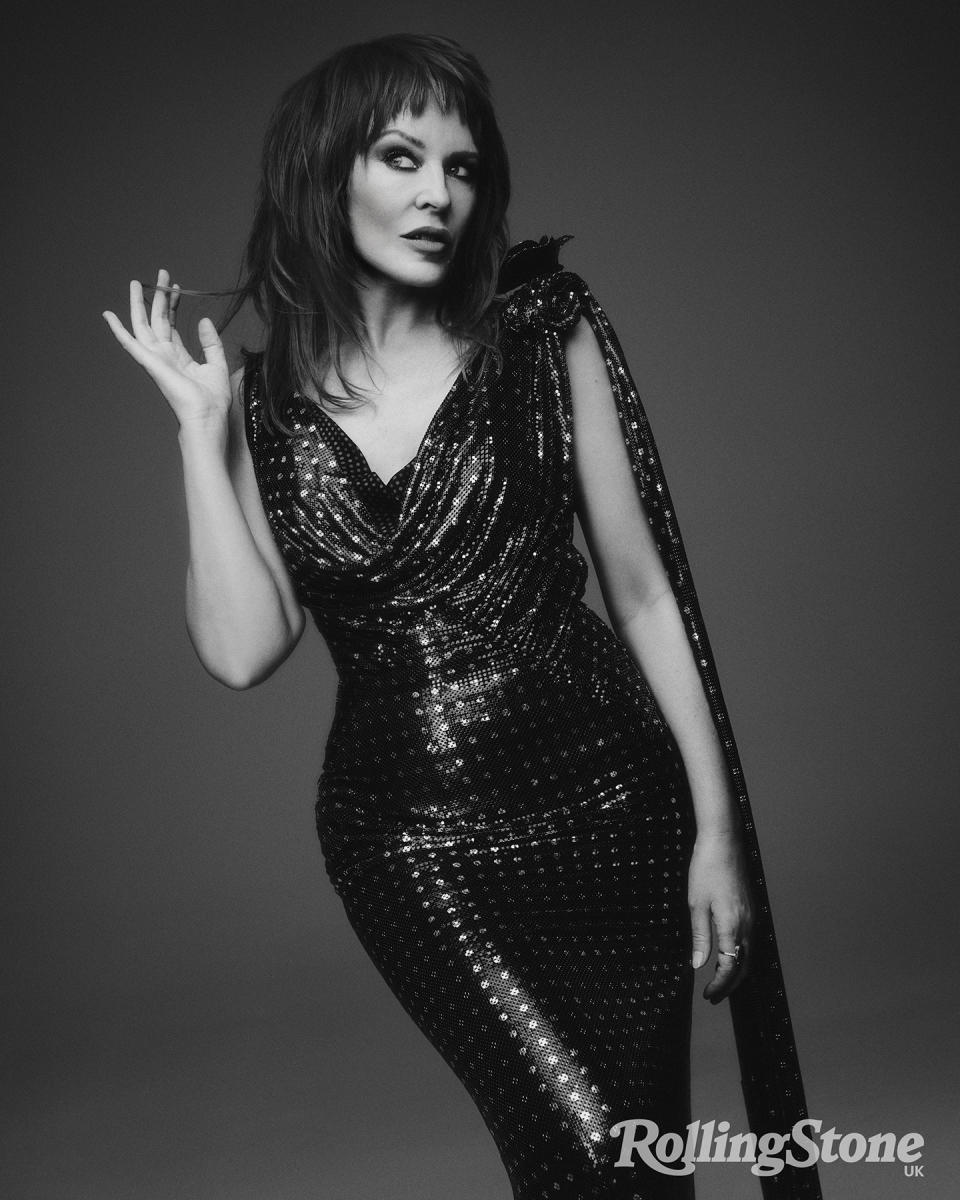
BECAUSE HER WORK never really feels over, it often takes someone like her A&R Nelson to tell her to stop working on a project for her to actually step away. Tension isn’t even out yet, and Minogue is still considering the endless possibilities of things she could have done more of or differently.
“You’ve just got to stop at some point,” she says. “So, now I’m thinking about what I’ll do with the live shows.”
Even her downtime in August, before the blitz of more press and promotional shows continues for album release month in September, is booked up. She’s planning her live appearance at September’s Radio 2 in the Park. And thoughts of Vegas, impending rehearsals and what the hell she’s going to put on the setlist are lingering in the back of her mind.
But Minogue is not the type of pop star to buckle under this schedule — she becomes a diamond from this level of pressure.
Still, she’s seen firsthand how quickly time can move. Even three decades living in London snuck up on Minogue. For her first five years there, she could barely admit that she had relocated, mostly due to the amount of travel she was doing regularly as her music career was getting established.
“It’s been a good point in time for me to be back in Melbourne,” she says. She has relished being closer to her parents, siblings and nieces and nephews.
She lives quite close to where she grew up and is not far from her high school when we catch up a few weeks after we met in Los Angeles. The significance of getting to reflect on her 35-year music career so close to where she “became a kind of pop addict” is not lost on her. “I still have my mono radio cassette. That was my portal to the world of music, unless I saved enough money to go buy that album on vinyl. This would not have been my prediction, but it might have been one of my dreams,” she reflects.
Looking back, Minogue has no big regrets. Sure, there are small things she wishes could change from albums and performances, the natural nit-picking that comes from being a perfectionist. And there are many times that she wishes she had stood up for herself more. Being thrown into the industry as a teenager meant it took a few years for her to finally build up enough confidence to say “yes or no” to certain things, but even those early albums still feel authentic to who she was at the time. “I would hate to be considered a puppet in the early days. Choices were still made. It’s not like someone just operates you,” she says.
There’s no question Minogue is in full control these days. As we discuss the creative process of the songs on Tension one by one, each comes with a detailed story of how every line and note was pieced together by her and her collaborators. Those studio nerves and bouts of stress tonsillitis are long gone. “I now take ages doing everything — because I can,” says Minogue casually, confidently.
Decades of making it look easy led to a near-frantic scramble for tickets to her Vegas residency. The first batch sold out quickly, leading to more dates being announced into 2024. She had the type of ticket anxiety that comes with being a legend, which is whether everyone could even get a ticket in the first place.
As she’s got older, she’s had more moments of soaking in her own impact and legacy. A moment that felt particularly significant in defining that was when she played the Legends Slot at Glastonbury in 2019. It was her first time at the festival, after her 2005 headlining spot was canceled due to her breast cancer treatment. “[It] is a huge deal for me to say: ‘I deserve to be here,’” Minogue says of Glastonbury.
“Every artist that’s ever existed was also riddled with insecurity and self-doubt and all of that stuff. But I feel like now it’s OK. I chased it. I longed for it for a long time. I thought it just might not ever happen for me. But I think there’s enough of it now,” says Minogue of her journey. “I don’t know that everyone knows the extent of what it’s taken for me to keep doing this. That respect is there. It’s taken its good old time. I feel a lot more peaceful than I did a while ago. It doesn’t change my drive and determination.”
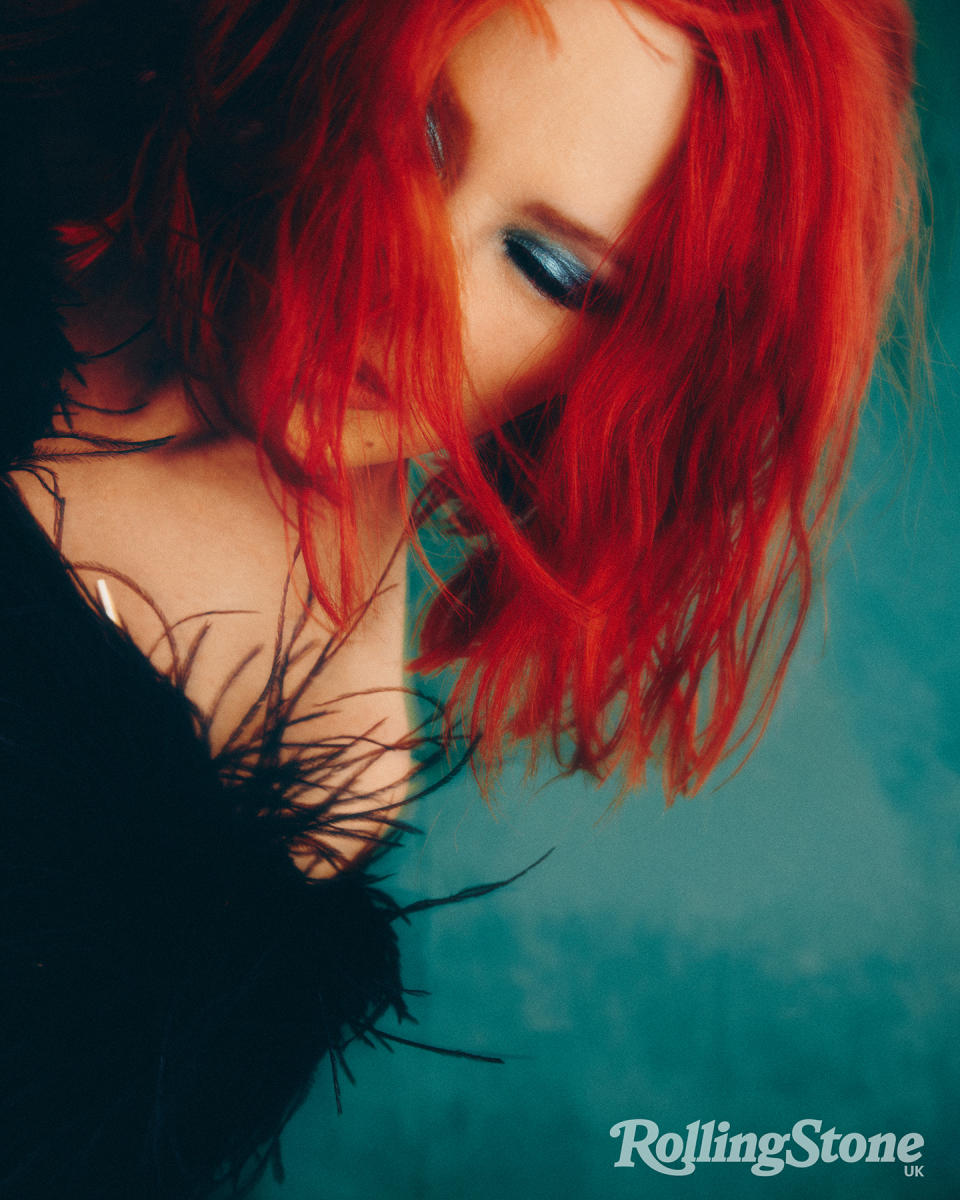
Soon Minogue will be moving to another country. Rehearsals for the residency will take place in Las Vegas after Tension drops, though Minogue is unsure where on the west coast she’ll call home during its run. She previously thought she would live in Los Angeles in 1999, having bought a house after Impossible Princess didn’t do as well as she and her label had hoped. “I just thought, ‘Oh well, maybe that’s it,’ and I got a place here in West Hollywood. Then I recorded ‘Spinning Around’ and ‘Light Years’ and it all took off again. I literally never got to stay here and sold it.”
Even though she’ll be moving to the States until at least the spring, much of Melbourne is coming with her. Her parents have already bought their tickets to Vegas for opening night; her mum along with a hairdresser who worked on an early film with Minogue in 1989 were the two people on tour with the budding star in the early days.
“They would be hand-washing all the dancers’ clothes in the bath of the hotel and rolling them up in towels and drying them overnight,” she recalls. “I think of the sacrifices my parents have made and what they’ve seen me go through. They’ve seen what I’ve had to give for this life and career, as amazing and wondrous and incredible [as] it is.”
As the keepers of Minogue’s most private truths, seeing her parents in the audience may allow Minogue the tiniest moment to lift the veil for the world to see: “I think that’s when I’ll fall to pieces.”
Production Credits
Fashion Direction by JOSEPH KOCHARIAN. Styling by BRADLEY KENNETH. Hair by SAMI KNIGHT at A-FRAME AGENCY using ARCTIC FOX. Makeup by ANTHONY N NGUYEN for KVD BEAUTY at THE WALL GROUP. Hair Assistant: ASHLEY GROSSBLATT. Production by ALEISHA DIGBY at WMA.
Best of Rolling Stone